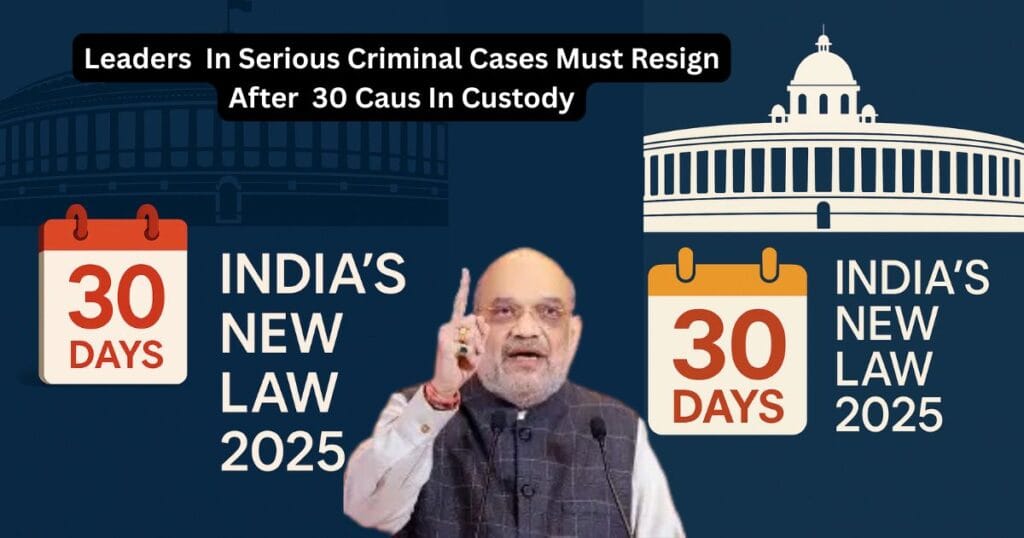For years, a burning question has echoed through New Law for Indian politics: should leaders accused of serious crimes continue to hold high offices like MPs, MLAs, or Ministers? Time and again, we’ve seen cases where politicians face grave charges, sometimes even getting arrested, yet they cling to their constitutional posts. This not only raises questions about good governance and ethical standards but also erodes the public’s trust in democratic institutions like Parliament or state assemblies.

Until now, there was no clear constitutional rule or law addressing this issue. Typically, the tradition was that arrested leaders would resign under moral pressure or due to political circumstances. However, this was entirely up to the leader’s discretion or the prevailing political climate. Often, leaders refused to step down, leading to controversies and public outrage. For instance, leaders like former Delhi CM Arvind Kejriwal or Jharkhand’s Hemant Soren held onto their posts for some time even while in jail.
Seeing these recurring issues, the Central Government felt the need for a robust law. The new rule states that if a Prime Minister, Chief Minister, or Minister is detained for over 30 days in a serious criminal case (one carrying a minimum 5-year sentence), they must vacate their post on the 31st day. The goal? To ensure:
- Transparent governance: Keeping honesty and clarity in administration.
- Public trust: Strengthening faith in democratic institutions.
- Accountability: Making high-ranking officials answerable to the law.
Let’s dive deeper into this game-changing New Law and what it means for India.
The Three Bills: What Are They and What Do They Do?
The Central Government has introduced three bills to bring this change, which will become laws once passed by Parliament. These aim to clean up Indian politics and ensure accountability. Here’s a simple breakdown:
1. Union Territories Government (Amendment) Bill 2025
This bill targets Union Territories like Delhi, Puducherry, or Chandigarh, where the Central Government has direct control. It mandates that if a Chief Minister or Minister in these regions is arrested and detained for 30 days in a serious crime, they must automatically resign or lose their post on the 31st day. However, if they are released later, they can return to their position.
Purpose: To make governance in Union Territories more transparent and accountable.
Example: Delhi often sees tussles between the Central and state governments. This law will set clear rules for such regions.
2. Constitution (130th Amendment) Bill 2025
This is the most significant bill, amending key parts of the Indian Constitution, including:
- Article 75: Governing the Union Council of Ministers (Prime Minister and Central Ministers).
- Article 164: Covering state governments (Chief Ministers and State Ministers).
- Article 239AA: Addressing Delhi’s special status.
This means the Prime Minister, Central Ministers, Chief Ministers, and State Ministers across India will fall under this rule. If any of them are detained for over 30 days in a serious crime, they must resign.
Key Point: For the first time, the Constitution will have a clear rule on this, replacing vague traditions with a legal framework.
3. Jammu and Kashmir Reorganization (Amendment) Bill 2025
Jammu and Kashmir has a unique administrative setup due to its special status in the past. This bill applies the same rule there – Chief Ministers and Ministers must resign after 30 days in detention for a serious crime. It amends existing laws to fit this framework.
Purpose: To ensure accountability and clean governance in Jammu and Kashmir.
Core Objective: These three bills aim to ensure no high-ranking leader can cling to power while facing serious criminal charges, thereby protecting the credibility of democracy.
Key Provisions of the New Law
Let’s break down the main rules of this New Law in simple terms:
- 30 Days in Custody = Automatic Removal: If a Prime Minister, Chief Minister, Central Minister, State Minister, or Union Territory leader is detained for 30 days in a serious crime (one with a minimum 5-year sentence), they will lose their post on the 31st day. This is called automatic removal.
- Reinstatement After Release: If the leader is released by the court or police, they can return to their post. This rule applies only during detention, not after conviction or sentencing.
- Applies to All: The law covers everyone – from the Prime Minister to State Ministers – with no exceptions.
- Removal Process:
- Prime Minister: Removed by the President or post automatically vacated.
- Chief Minister: Removed by the Governor.
- State Ministers: Removed by the Chief Minister.
- Union Territories: Removed by the Lieutenant Governor.
- Legal Clarity: Earlier, resignations depended on moral pressure or politics. Now, it’s a legal obligation, making the process crystal clear.
These rules aim to prevent leaders from misusing power and to restore public trust in democracy. In my view, this was long overdue, as the lack of clear rules often led to confusion and controversies.
Impact on Prime Ministers, Chief Ministers, and Ministers
Previously, the Indian Constitution had no strict New Law mandating leaders to resign after arrest. Resignations happened due to moral pressure or political situations, but they were not mandatory. For example, leaders like Arvind Kejriwal and Hemant Soren managed to hold office for some time even from jail. This new law changes that.
What’s New?
- If a leader – be it the Prime Minister, Chief Minister, or any Minister – is detained for 30 days in a serious crime (carrying a 5+ year sentence), their post will automatically end on the 31st day.
- The rule applies uniformly across India, from Central Government to states and Union Territories.
- If released or granted bail, leaders can return to their posts, ensuring no injustice to the innocent.
- Clear guidelines will exist for courts, Presidents, and Governors on when and how to remove someone.
This will make leaders more accountable and ensure cleaner governance. It’s a bold step toward strengthening Indian democracy, though some worry about potential misuse.
Opposition’s Concerns and Political Controversy
The opposition has fiercely opposed these bills, calling them a Central Government plot to destabilize non-BJP-ruled states. Here’s what they’re saying:
- Misuse of Agencies: The opposition claims the Centre will misuse agencies like the CBI and ED to target opposition leaders, arrest them in false cases, and force them out after 30 days in custody.
- Threat to Federalism: Congress MP Abhishek Manu Singhvi and TMC leaders argue this law undermines the federal structure by sidelining courts and removing leaders without conviction.
- Political Vendetta: TMC’s Mahua Moitra says this is a tool to crush opposition parties. They point out that in the last 11 years, no BJP leader has been arrested, while opposition leaders face frequent probes.
- Lok Sabha Chaos: The opposition created an uproar in Parliament, threatening to tear up the bill copies and disrupt proceedings. They call it a danger to democracy.
The government has proposed sending the bills to a Joint Parliamentary Committee (JPC) for wider discussion, but the opposition remains unconvinced. Personally, I think political disputes are common, but the real test is whether this law will be implemented fairly.
Supporters’ Arguments: A Step Toward Transparency
Those in favor of the New Law argue it strengthens democratic ethics. Their key points:
- Ethical Leadership: Leaders represent the public and must uphold integrity. Allowing someone detained for serious crimes to stay in power undermines democracy.
- Legal Framework: With no clear rules earlier, this law creates a system to prevent corruption and power misuse.
- Public Trust: Showing that leaders are accountable to the law will boost confidence in governance.
- Safeguards for Innocents: Leaders can return to their posts after release, protecting those wrongly accused.
I agree that leaders facing serious charges shouldn’t hold power, as it sends the wrong message. This law could clean up politics if used fairly.
Public and Expert Reactions
What Do Legal Experts Say?
Constitutional scholars believe this New Law is a major step toward defining ethical standards. Previously, there was no mandatory rule for removing detained leaders. However, some experts stress the need to protect judicial independence and the rights of those presumed innocent until proven guilty.
Public Opinion
The public is divided:
- Supporters: Many see this as a boost for democracy and clean governance, ensuring leaders are accountable.
- Critics: Some fear misuse, where leaders could be targeted without solid evidence due to political rivalry.
Analysts’ Views
Political and social analysts say New Law will curb criminalization in politics but warn that its success depends on fair implementation. It’s a step toward cleaner politics, but only time will tell its true impact.
What Was the Old System? Past Rules and Traditions
Before this New Law, the Constitution had no clear rule on removing leaders after arrest. They could stay in office until convicted. Resignations happened due to moral pressure or opposition protests, but they weren’t mandatory. For example:
- Leaders like Arvind Kejriwal and Hemant Soren ran governments from jail for some time.
- Resignations often followed court orders or political pressure, but there was no legal obligation.
What’s Different Now?
The new law makes it mandatory to resign after 30 days in custody. This is a huge shift from the earlier flexible traditions, ensuring automatic action.
Potential Impacts of the New Law
- Curbing Criminalization in Politics: Leaders with serious charges won’t stay in power, reducing criminal elements in politics.
- Improved Governance: Accountability will make governance more transparent, boosting public trust.
- Political Instability?: Opposition fears this could destabilize non-BJP states, especially where political rivalry leads to frequent arrests.
- Protection for Innocents: Leaders can return post-release, ensuring no harm to those wrongly accused.
- Stronger Democracy: Showing that no one is above the law will reinforce democratic values.
- Federal Structure: Uniform rules across states and Union Territories will create a consistent accountability framework.
40% GST on Online Gaming in India: What It Means for India’s Gaming Industry
What is the new 30-day rule for politicians in India?
The new law says that if a Prime Minister, Chief Minister, or any Minister is arrested and kept in custody for more than 30 days in a serious criminal case (with at least 5 years’ punishment), they will automatically lose their post on the 31st day. Earlier, resigning was optional, but now it’s legally mandatory.
Can leaders return to their post after being released from jail?
Yes. If the leader is released or granted bail, they can come back to their position. The rule applies only during detention, not after conviction. This ensures that genuinely innocent leaders are not unfairly punished.
Why is this new law facing criticism from the opposition?
Opposition parties worry that the Central Government might misuse agencies like the CBI or ED to target non-BJP leaders. They argue that arrests without conviction could be used as a political weapon, which may disturb the balance of India’s federal structure.
Conclusion: A New Dawn or a Political Weapon?
This new law could be a landmark for Indian democracy, clearly stating that leaders detained for 30 days in serious crimes must resign. It promises transparency, accountability, and stronger public trust. However, the opposition’s concerns about potential misuse cannot be ignored. If used as a political tool to target non-BJP states, it could destabilize governance and harm federalism. The success of this law depends on fair and transparent implementation. If done right, it could usher in a cleaner era for Indian politics. If misused, it might spark new challenges. Only time will reveal its true impact. What do you think? Share your thoughts in the comments below!


